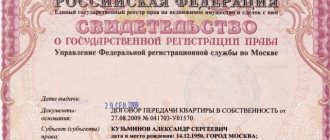A fine for expired registration is an administrative measure applied to citizens who have violated the requirements of the law regarding the registration of persons living in the territory of the Russian Federation, in accordance with which society and the state introduce registration at the place of residence and place of stay. Thus, a person who has an expired registration or does not have one is subject to administrative prosecution.
The concept of registration and punishment for its absence
Registration involves registering a citizen at the place of residence or stay. The concept of place of residence in this case means a residential premises in which a person permanently or temporarily resides. Accordingly, the first option is permanent registration, the second is temporary registration.
Sanctions for violating registration rules, as well as living without registration, are provided for in two articles of the Administrative Code. Article 19.15.1 applies to persons who do not have registration, article 19.15.2 - to citizens who have violated the registration rules. Moreover, in both cases, the same type of punishment is applied to the offender; only the amount of the fine imposed on the guilty person differs. In this case, much will depend on who and in what region the registration expired, how much time has passed and whether a fine was previously imposed.
Who needs registration
The first step is to figure out who needs to register in Russia. The thing is that it is not always necessary to go through this procedure. It is proposed to stay in the country for a certain amount of time without registering. But more on that a little later.
A fine for lack of registration in Russia will be imposed only when a certain period has expired. And only in relation to specific categories of persons.
Now liability for lack of registration in the Russian Federation at the place of residence or temporary stay occurs for:
- all adult citizens of Russia;
- minors residing permanently in the country (more precisely, punishment awaits their legal representatives);
- foreigners who decided to stay in the Russian Federation for a long time;
- people who do not register at the place of residence of people using this or that living space.
Thus, punishment will await any person who was not subject to registration, but has been in Russia for a long time. Quite normal. Foreigners can even be deported. And in this case, they are not only subject to a fine for lack of registration. This fact must be taken into account. More about him a little later. First, it’s worth understanding how long you are allowed to remain unregistered.
No temporary registration
If a citizen enters the territory of the Russian Federation or temporarily arrives in another subject of the country, the period of his stay in the new territory cannot exceed ninety days. This means that before the expiration of a three-month period, a citizen has the right to stay at the place of residence without registration, however, after the period established by law, he is obliged to obtain a temporary registration.
Moreover, for foreigners, the period of stay on the territory of the Russian Federation without registration is much shorter than for citizens of the country. They must apply for registration no later than three days from the date of arrival.
Temporary registration involves registration not only in residential buildings, but also in other premises, for example, in sanatoriums, hotels, boarding houses, and government institutions. The management of some of them independently registers visiting citizens. However, if, after the expiration of the permitted period of stay, the fact of lack of registration is revealed, the citizen himself, as well as the person responsible for registering him, will be punished.
In this case, an expired temporary registration threatens to result in a fine:
- from 2000 to 3000 rubles - for the offender himself;
- from 2000 to 5000 - for tenants and owners who have not registered temporary residents;
- from 250,000 to 750,000 rubles - for legal entities.
At the same time, higher fines are applied to violators living in cities of federal significance than in other regions:
- from 3,000 to 5,000 rubles - for a citizen without registration;
- from 5,000 to 7,000 thousand rubles - for home owners;
- from 300,000 to 800,000 thousand rubles - for organizations.
It might be interesting
How to register at your place of residence correctly
Fines in case of lack of registration
The most important legislative act regulating registration issues is the Law of the Russian Federation of June 25, 1993, No. 5242-1 “On the right of Russian citizens to freedom of movement, choice of place of residence and stay on the territory of the Russian Federation.”
For a long time in our country there was an institution of compulsory registration of citizens at their place of residence, which had to be strictly observed. But, due to the instructions of the legislation in force in 2020, now citizens must register, which is of a notification nature. That is, they must notify government authorities about this within a certain period of time after changing their place of temporary or permanent residence.
In the absence of registration, which serves as a guarantee for citizens to exercise their rights, violators are subject to penalties in the form of fines. The amount of penalties is established in the articles of the Code of Administrative Offenses of the Russian Federation.
According to Art. 19.15.1 of the Code of Administrative Offenses of the Russian Federation, the guilty persons are not only the tenant who does not have registration, but also the owner of the apartment who allowed such residence.
The fines established in this article are different for certain categories of violators:
- from 2000 to 3000 rubles for citizens not registered in residential premises;
- from 2000 to 5000 rubles for individual homeowners;
- from 250 to 750 thousand rubles. in relation to legal entities - owners of residential premises.
Fines for the absence of registration in the federal cities of Moscow and St. Petersburg have been increased :
- from 3000 to 5000 rubles for citizens of the Russian Federation;
- from 5000 to 7000 rub. for premises owners;
- from 300 to 800 thousand rubles. in relation to legal persons
These are the prices for failure to register in the specified cities.
In case of delay and late registration
If a citizen has not fulfilled the obligation to timely register, he may be held accountable in accordance with the law. For example, this can happen if one apartment was sold, and the other one in its place was not registered on time. How much is the penalty for late registration?
First of all, you need to determine how long it takes to complete the registration procedure.
In accordance with the above law, every citizen must notify the internal affairs authorities of the change:
- places of temporary stay - no later than 90 days;
- place of permanent residence - within a week.
Violation of these deadlines is an offense and entails penalties. But the Code of Administrative Violations of the Russian Federation does not distinguish between these two types of offenses. In practice, when a citizen registers late, i.e. untimely, then the fact of its absence is established, which is considered a violation. Therefore, he will pay for the offense committed under the same article 19.15.1 of the Code of Administrative Offenses of the Russian Federation.
No permanent registration
Every citizen of the country living in a particular region, including newborn children, needs permanent registration. The concept of permanent registration in this case implies the residence of a person in the territory of one subject throughout his life. At the same time, a citizen can have both permanent and temporary registration within his region, for example, if he is registered from birth in the regional center, and performs work duties in another city in his region, and therefore most of the time he is forced to stay at the place of temporary stay.
The same cannot be said about moving. If a citizen moves for permanent residence to another place, registration at the new place of residence must be completed no later than seven days from the date of arrival. For newborn children, a thirty-day period is applied. Children under the age of fourteen, in accordance with legal requirements, are registered at the address of one of the parents (optional), regardless of the type of registration.
A fine for overdue registration of children is imposed on their legal representatives, that is, as a rule, on the child’s parents. The amount of the fine for the lack of permanent registration, including registration of a child, as well as in the case of lack of registration at the place of residence, is determined in accordance with the provisions of Article 19.15.1 of the Code of Administrative Offenses of the Russian Federation.
Deadlines and fines
What fine you will have to pay for an expired registration depends on its form. Thus, only 7 days are given to register at the place of residence on a permanent basis. During this time you need to register at a new address. When registration is granted temporarily, it is allowed to issue a certificate within 90 days.
Important! Foreign citizens who arrived in the Russian Federation on a visa or have a residence permit must visit the migration service department 7 days from the date of arrival. Otherwise, they face a fine for registering late.
According to the Administrative Code, a fine is provided for overdue registration without special reasons. It follows that sufficiently compelling reasons may exempt you from paying a fine.
Such reasons include hospitalization, the funeral of a loved one, or long-term travel for work. Any of these situations will have to be documented. If a person does not have such reasons, when applying for renewal of temporary registration, he will have to pay a fine for late registration.
Amounts of fines
The amount of the fine for late registration is determined taking into account several factors:
- For individuals, the absence of a stamp in their passport means the need to pay a fine of up to 3 thousand rubles.
- If the violator lives in the capital unregistered, the fine is up to 5 thousand rubles.
- The owner of the property in which an unregistered person lives will have to pay an administrative fine of up to 7 thousand rubles in Moscow and up to 5 thousand in other populated areas.
- Lack of registration for a foreigner is punishable by a fine of 5-7 thousand rubles, deportation and a ban on entry for a five-year period.
- A housing tenant or its owner who fails to report the residence of unregistered persons to the migration department will receive a fine of 2-3 thousand rubles. If such a violation is committed by the organization, the amount will increase to 4-7 thousand rubles.
What amount of the fine will be imposed ultimately depends on the decision of the registration authority.
Where to apply for registration and where to pay the fine Today, citizens who need registration have several ways to apply for registration.
You can do this:
- Through the State Services portal (if you have a confirmed account) by submitting an electronic application;
- Through the department of the Multifunctional Center during a personal visit;
- By contacting the registration authority directly (local migration department of the Ministry of Internal Affairs);
- When you personally visit the passport office of the company servicing the residential building (MC or HOA).
The citizen himself decides which treatment option to choose, but the decision to prosecute for expired registration can only be made by an authorized body, that is, employees of the migration department. The same body decides how much the fine will be.
In accordance with administrative legislation, a resolution to bring the violator to justice is served personally, after which the citizen is given sixty days to pay the fine. If, after the period established by the administrative code, the migration department does not receive a notification of payment, there is a high probability that the citizen will be held administratively liable for failure to pay a fine within the period established by the Code (Part 1 of Article 20.25). In this case, the violator faces consequences including administrative arrest.
After imposing a punishment, a natural question arises: where to pay the fine for overdue registration? Since the authorized body does not have the right to accept cash from citizens, the fine can only be paid through a bank. At the same time, there are no restrictions regarding the choice of payment method, so you can deposit funds into the account of the Main Department of Migration Affairs of the Ministry of Internal Affairs:
- at a branch of a credit institution;
- online through the personal account of the user of banking services;
- through the bank terminal.
After making the payment, it is advisable to keep the receipt for payment of the fine. In practice, due to software failures, the fact of payment is not always visible, as a result of which the authorized body may request a payment document.
Federal significance
But there are a few more nuances that will have to be taken into account. The importance of the region plays a huge role. In ordinary regions and cities, payments are much less than in areas of Federal significance. And you will have to realize this fact before refusing to register.
At the moment in Russia, the fine for lack of registration at the place of residence/stay for Russian citizens who live in cities of Federal significance (namely Moscow and St. Petersburg) is set at up to 5,000 rubles. The minimum payment in this case will be 3,000. But there are some peculiarities here too. Which ones exactly? The specified limits for both ordinary cities and regions of Federal significance increase under certain circumstances.
Is it possible to avoid responsibility?
If the fact of committing an administrative offense is obvious, it is unlikely that it will be possible to avoid punishment. However, any decision by an official may be appealed. The period for filing a complaint is ten days from the date of delivery of the decision, however, there is no particular point in filing a complaint if the citizen is held accountable within the framework of the law. For example, you should not file a complaint on the sole basis that the perpetrator did not know that every citizen of the country needs to register. Ignorance of the laws does not in any way diminish the guilt of the offender.
However, not for all categories of violators, expired registration is a death sentence. How to avoid a fine under current legislation? The answer to this question is contained in the note to Article 19.15.1, according to which you can avoid punishment for absence or untimely registration if the following circumstances exist:
- If a citizen is registered and temporarily resides in another city within one subject of the country.
- If a citizen lives without registration in a city of federal significance, but is registered in the same subject in which this city is located.
- If a citizen lives without registration in the same residential premises with his close relative, who is the owner or tenant of this premises. In this case, close relatives are considered to be the spouse, parents (including adopted ones), children (including adopted ones), grandchildren, grandparents.
In other cases, the lack of registration or untimely registration are gross violations of administrative legislation.
Citizens of the Russian Federation
Speaking about permanent residents of Russia, it can be noted that for them a fine for lack of registration at the place of residence is a more real responsibility. After all, slightly different restrictions apply to such people.
An adult citizen of the Russian Federation must have one form or another of registration. And it doesn’t matter which one. Permanent or temporary, but it must take place. Without registration, permanent residents of the country are allowed to stay for only 7 days. The countdown begins from the moment of discharge from the previous place of residence.
But this is not the only limitation. This nuance is also relevant for minors. Their parents must register or temporarily register them in housing within a week from the date of discharge. The exception is newborns. Why?







